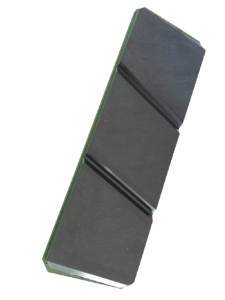Traditional brake pads can put a strain on the environment, but Regal Rexnord has a solution that is being implemented worldwide.
One could be forgiven for only considering tailings when thinking about mine waste, but there are numerous points throughout the mining value chain where waste can be found.
Luckily, modern mines have a myriad of options when it comes to these sources of waste, with manufacturers working to help miners step into a new era of sustainability.
One well-known source of waste in any industry are brake pads. While essential to safety, traditional brake pads are designed to wear down through friction that can release harmful materials and particulates into the environment.
That’s why Regal Rexnord, through its brake solutions arm Svendborg Brakes, developed an organic green brake pad, which aims to ensure not only functionality but overall sustainability.
Regal Rexnord national product manager Rex Sinclair said the innovation was born out of the company’s ‘green principles’.
“By focusing on energy-efficient products and systems, we aim to reduce the power required to deliver motion, thereby enhancing productivity while minimising environmental impact,” Sinclair told Australian Mining.
“This commitment not only addresses the growing demand for sustainable practices but also aligns with Regal Rexnord’s dedication to innovation and customer satisfaction.
“Through these efforts, Regal Rexnord strives to contribute to a more sustainable future, benefiting both its customers and the planet.”
The green brake pads were originally designed to meet the stringent environmental and performance requirements of wind turbines with a diverse range of friction qualities.
Once Regal Rexnord saw the benefits the green brake pads were able to achieve in turbines, they were developed for other technologies like mining conveyors.
Today, the green brake pads can be found in not only conveyors but mine winders, winches and hoists, as well as ball and sag mills.

“The development of Svendborg Brakes’ green brake pads was driven by the need to address environmental concerns associated with traditional brake pads, originally starting with wind turbines,” Sinclair said. “Traditional brake pads often produce dust that can contaminate the environment and pose health risks to maintenance personnel.
“By creating brake pads made from non-asbestos organic materials, Svendborg Brakes aimed to reduce the environmental impact and enhance safety.”
Sinclair said the innovation was thanks to the company’s extensive research and development (R&D) capabilities, which includes an engineering team based in Newcastle, New South Wales.
“As a result of significant investment and accumulated knowledge, our engineers have developed an eco-friendly material for our brake pads,” he said. “We have a full-time chemist specialising in brake pad compounds along with a test centre where all our products are tested and certified.”
With customers across the world, it was important to Regal Rexnord and Svendborg Brakes that the green brake pads be compliant with European registration, evaluation, authorisation and restriction of chemicals (REACH) legislation, which places responsibility directly on industry to manage chemical risks in products with the aim of protecting human health and the environment against harmful substances.
The brakes also stand up to the rigorous EU Restriction of Hazardous Substances Directive, which restricts the use of 10 substances known to cause harm to health and the environment.
Adherence to these standards, decades of know-how and field testing from its full-scale test centres, and the ability to simulate individual applications based on customer needs, has put Regal Rexnord ahead of the curve when it comes to sustainable braking solutions.
“The green brake pads comply with REACH regulations, ensuring they are free from hazardous substances like mercury, chromium, and lead,” Sinclair said. “With mines looking more into green alternatives and enhanced safety, this ticks all the boxes.
“This commitment to green solutions underscores Svendborg Brakes’ dedication to sustainability and innovation in the brake industry.”
This feature appeared in the November 2024 issue of Australian Mining.




